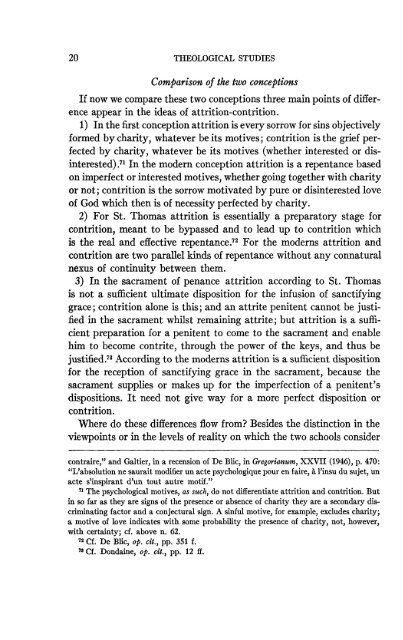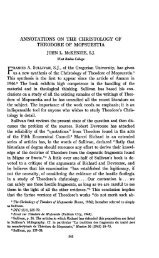Two Concepts of Attrition and Contrition - Theological Studies
Two Concepts of Attrition and Contrition - Theological Studies
Two Concepts of Attrition and Contrition - Theological Studies
You also want an ePaper? Increase the reach of your titles
YUMPU automatically turns print PDFs into web optimized ePapers that Google loves.
20 THEOLOGICAL STUDIES<br />
Comparison <strong>of</strong> the two conceptions<br />
If now we compare these two conceptions three main points <strong>of</strong> difference<br />
appear in the ideas <strong>of</strong> attrition-contrition.<br />
1) In the first conception attrition is every sorrow for sins objectively<br />
formed by charity, whatever be its motives; contrition is the grief perfected<br />
by charity, whatever be its motives (whether interested or disinterested).<br />
71 In the modern conception attrition is a repentance based<br />
on imperfect or interested motives, whether going together with charity<br />
or not; contrition is the sorrow motivated by pure or disinterested love<br />
<strong>of</strong> God which then is <strong>of</strong> necessity perfected by charity.<br />
2) For St. Thomas attrition is essentially a preparatory stage for<br />
contrition, meant to be bypassed <strong>and</strong> to lead up to contrition which<br />
is the real <strong>and</strong> effective repentance. 72 For the moderns attrition <strong>and</strong><br />
contrition are two parallel kinds <strong>of</strong> repentance without any connatural<br />
nexus <strong>of</strong> continuity between them.<br />
3) In the sacrament <strong>of</strong> penance attrition according to St. Thomas<br />
is not a sufficient ultimate disposition for the infusion <strong>of</strong> sanctifying<br />
grace; contrition alone is this; <strong>and</strong> an attrite penitent cannot be justified<br />
in the sacrament whilst remaining attrite; but attrition is a sufficient<br />
preparation for a penitent to come to the sacrament <strong>and</strong> enable<br />
him to become contrite, through the power <strong>of</strong> the keys, <strong>and</strong> thus be<br />
justified. 73 According to the moderns attrition is a sufficient disposition<br />
for the reception <strong>of</strong> sanctifying grace in the sacrament, because the<br />
sacrament supplies or makes up for the imperfection <strong>of</strong> a penitent's<br />
dispositions. It need not give way for a more perfect disposition or<br />
contrition.<br />
Where do these differences flow from? Besides the distinction in the<br />
viewpoints or in the levels <strong>of</strong> reality on which the two schools consider<br />
contraire," <strong>and</strong> Galtier, in a recension <strong>of</strong> De Blic, in Gregorianum, XXVII (1946), p. 470:<br />
"L'absolution ne saurait modifier un acte psychologique pour en faire, a l'insu du sujet, un<br />
acte s'inspirant d'un tout autre motif."<br />
71 The psychological motives, as such, do not differentiate attrition <strong>and</strong> contrition. But<br />
in so far as they are signs <strong>of</strong> the presence or absence <strong>of</strong> charity they are a secondary discriminating<br />
factor <strong>and</strong> a conjectural sign. A sinful motive, for example, excludes charity;<br />
a motive <strong>of</strong> love indicates with some probability the presence <strong>of</strong> charity, not, however,<br />
with certainty; cf. above n. 62.<br />
72 Cf. De Blic, op. cit., pp. 351 f.<br />
73 Cf. Dondaine, op. cit., pp. 12 ff.

















